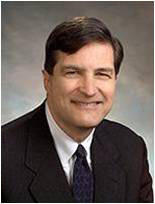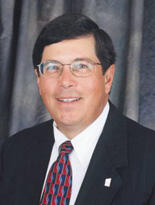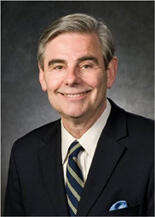April 21, 2009
Business leaders discuss the economy in 'extraordinary conversation'
Share this story
Positive signs have emerged in the U.S. economy in early 2009, prompting optimism that the recession that has afflicted the country has an end in sight, according to Jeffrey Lacker, president of the Federal Reserve Bank of Richmond, who spoke at the VCU School of Business on April 17 in a panel discussion organized through the annual Charles G. Thalhimer Family Executive-in-Residence Program.

Lacker was joined on the panel by Steven Markel, vice chairman of the Markel Corp., and John Nelson, executive vice president and chief technology officer of Altria Group Inc., speaking before an audience of more than 200 students, faculty and local business leaders. Edward Millner, chair of the Department of Economics at VCU, moderated.
Each panelist examined the recent economic turmoil from the particular perspective of his field – central banking, financial services, consumer packaged goods – occasionally stepping back to take a broader view of the business climate. The discussion, “An Extraordinary Conversation for Extraordinary Times,” pored through the roots of the recession, the current state of the economy and what the future holds.
Lacker told the crowd that “extraordinary times” was an understatement when describing recent economic events. The country is in its most significant recession since the Great Depression, he said, and the federal government has taken some unprecedented steps in response. However, the economy will not approach the devastation of the Great Depression, he said. In fact, he expects the economy will climb out of the recession by the end of the year. Dismal economic reports have been replaced by mixed ones, he noted, and the data accumulating indicates that the country’s gross domestic product will be expanding again before the beginning of 2010.
In his remarks, Nelson said it was important for businesses to recognize opportunities in a downturn and to focus on operations and on their customers. In some cases, an economic downturn can prove to be an ideal time to launch a new brand, Nelson said, highlighting a list of iconic brands that have been introduced during previous recessions, such as Kraft Mac and Cheese, IHOP, Microsoft and FedEx.
Nelson explained to the audience that Altria has some central strategies it uses to guide it in tough times, including:
- Capture insight into the changing needs of consumers and respond to it
- Cut costs and drive efficiencies
- Pursue strategic mergers and acquisitions – looking to buy quality at a discount
- Innovate to add new value to current products and offer new products to meet unmet consumer needs

Markel said he believes Markel Corp. is well-positioned to take advantage of the economic recovery that will occur. He said the company was not immune to the “extraordinary” volatility of the markets but had avoided many, if not all, of the financial instruments that have caused so much trouble for other financial institutions, including some insurers. He said insurance claims tend to increase during a recession, but Markel Corp. has not seen a significant increase in claims, helping it weather the storm.
The panelists each addressed lessons they hope the country has learned by the downturn. Lacker said he believes homeownership has important benefits, but he wonders if it has been “overpromoted” – that sometimes it’s not the most prudent choice, such as for low-income people who are especially vulnerable to a financial shock.
Nelson said he would like to see increased government regulation of derivative traders, who make “a claim on a claim on a claim ...”
Lacker said he worried about the government and business community learning the wrong lessons and over-reacting, particularly by doing too much to limit financial innovations, which “have been here for years and done a lot of good.”
Markel, meanwhile, said he hoped that the country would not simply pack the current problems away when prosperity returns – thereby ensuring that the same mistakes will haunt them again.
“I’m afraid we’re going to forget the conversation that we’re having three, five, 10 and 30 years from now,” Markel said.
In the spirit of the Thalhimer program, the panelists often spoke directly to the many VCU students in attendance.
Lacker urged students to be prepared to make difficult decisions – ones that require knowledge, deep study and fortitude. The leaders of the Federal Reserve, he noted, are faced with challenging, hugely consequential questions without easy solutions.
“Ideas matter,” Lacker said. “None of the policy measures that we’ve taken were obvious, none were uncontroversial and none were without uncertainty. But somebody had to make them.”
The Thalhimer panelists took a number of questions from the audience. Andrew Garrison, a VCU student, asked what advice they would give upstart businesses trying to grow during a time of low consumer confidence.

Nelson said it is critical for a young business to understand its consumer’s needs and how the business can serve those needs. Markel emphasized the importance of creating a team spirit and common culture in the workplace – something he said is especially critical when things are not going well and a splintered, self-centered work force could mean the demise of the business.
Students graduating in May face an exceptionally lean job market. The panelists told students to look for components beyond salary and prestige in a job. Lacker said new graduates should hone in on what they’re going to learn in potential jobs – “focus on skill development, not money” – and Markel recommended they look at the people they will be working alongside and aim to do something they’re passionate about.
Nelson reminded students that their first job does not amount to a firm career choice and that they should not stress too much about the initial path they choose, noting that he had not joined the business world until he was 30 years old.
Subscribe to VCU News
Subscribe to VCU News at newsletter.vcu.edu and receive a selection of stories, videos, photos, news clips and event listings in your inbox.










